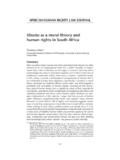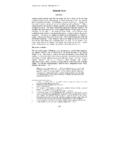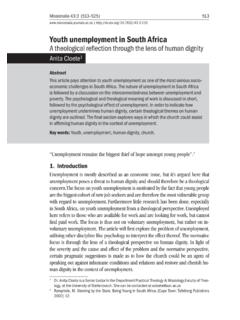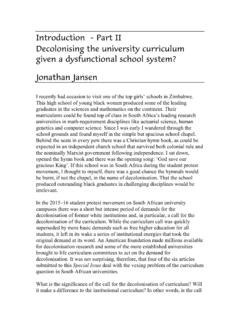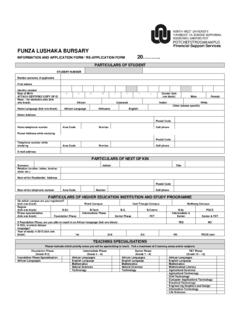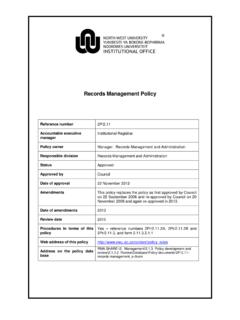Transcription of Coding and data analysis during qualitative …
1 Page 1 of 9 Original dedicate this article to Prof. George Lotter, who has been instrumental in the formation of more than 90 postgraduate students in practical theological studies at the North-West University (NWU). Under his guidance, a significant amount of empirical research has been conducted. This is in line with a movement among scholars, both national and international, towards a more empirical approach in Practical Theology. It is therefore indispensable that both lecturers and students in Practical Theology should further develop their empirical research capacities. In this article, it is argued for a more systematic approach during the Coding and data analysis phase of qualitative research and the article concludes with a proposed model for Coding and data analysis in practical theological :Petria M.
2 Theron1 Affiliation:1 Faculty of Theology, School of Biblical Counselling and Church Ministry, North-West University, Potchefstroom Campus, South AfricaCorrespondence to:Petria address:Bali Hoff 07, Pezcod Street, Potchefstroom 2531, South AfricaDates:Received: 10 Sept. 2014 Accepted: 07 Sept. 2015 Published: 13 Nov. 2015 How to cite this article:Theron, , 2015, Coding and data analysis during qualitative empirical research in Practical Theology , In die Skriflig 49(3), Art. #1880, 9 pages. : 2015. The Authors. Licensee: AOSIS OpenJournals. This work is licensed under the Creative Commons Attribution and data analysis during qualitative empirical research in Practical TheologyRead online:Scan this QR code with your smart phone or mobile device to read broad theme of this edition of In die Skriflig/In Luce Verbi in honour of Prof.
3 George Adrian Lotter is Pastoral Theology in SA: Semper reformanda . The Latin phrase semper reformanda means always reforming and it has become a widely known motto of the reformed tradition (Troxel 2006). It first appeared in 1674 in a devotional by Van Lodenstein, an important figure in a movement known as the Dutch Second Reformation (Horton 2014). The phrase is often used and even misused as a motivation or justification for change, for example that churches should be more open to move beyond the faith and practice they confess in their doctrinal standards and allow innovation. However, Troxel (2006) and Horton (2014) make a strong appeal that one should use the phrase according to its true meaning of always being reformed or changed 1 in accordance with Scripture and the Lordship of Jesus The doctrine of the church was reformed during the Reformation, but in the 21st century the lives and practices of God s people need further reformation.
4 Wolters (1992:1) stresses the point that incessant reformation should conform to the Word of God (Rm 12:2) and not, as Horton (2014) warns, to the spirit of the have come to know George Lotter not only as a person who is willing to change according to the Word of God, but also as somebody who is open to change, new ideas and new ways of doing things in practising his subject, pastoral studies. However, he does not approach change in an uncritical manner, but evaluates it against the truths of God s Word. To me, he personifies somebody who is faithful to the reformational principal of semper reformanda. The choice of the title of his article on how secular psychology has taken over the field of traditional biblical counselling during the 19th and 20th centuries, and how Jay Adams has done pioneer work to regain the ground, is significant, namely The reformation of counselling.
5 Lotter (2001:328) demonstrates how the motto semper reformanda can be put into practice in academic endeavours, especially in pastoral theology and biblical counselling. Although Lotter worked and still works in the Oxford s translation of the Latin phrase semper reformanda is given as always to be reformed (Bowker 1999:874). Scriptura and Solus Christus are two of the five well-known reformational principles (Vorster 2010:432).Kodering en data -analise tydens kwalitatiewe empiriese navorsing in Praktiese Teologie. Hierdie artikel word aan prof. George Lotter opgedra. Deur die jare was hy instrumenteel in die vorming van meer as 90 nagraadse studente in Praktiese Teologie by die Noord-Wes Universiteit (NWU).
6 Baie empiriese navorsing het onder sy leiding plaasgevind. Dit is in ooreenstemming met die nasionale en internasionale tendens van n meer empiriese benadering in Praktiese Teologie. Dit is dus van die uiterste belang dat Praktiese Teologie-dosente en -studente se vaardighede in empiriese navorsing verder ontwikkel moet word. In hierdie artikel word aangetoon dat n meer sistematiese benadering gevolg moet word tydens die kodering en die data -analisefase van kwalitatiewe navorsing. n Model vir die kodering en data -analise vir navorsing in Praktiese Teologie word ook 2 of 9 Original Researchfield of Pastoral Theology, justifying the choice of the theme of this edition of In die Skriflig/In Luce Verbi in his honour, I choose to write this article in the broader domain of Practical Theology as will also become evident in the research results later.
7 I therefore deem it necessary to briefly situate Pastoral Theology within the broader domain of Practical the time of modernity, Practical Theology was restricted to the application of doctrine in pastoral situations, but from 1950 onwards, scholars in theology and religion have challenged this point of view (Miller-McLemore 2012:1). One can speak of a revival of Practical Theology during the early 1980s when the need for practical knowledge became evident. Researchers like Browning, Poling, Miller, Forrester and Dykstra in the United States, Ballard and Pritchard in England and Van der Ven from the Netherlands, among others, responded by viewing the role of Practical Theology anew (Miller-McLemore 2012:2 3). In the process, it became clear that it is not easy to define Practical Theology.
8 It is a multivalent discipline found in a wide range of spaces and places. Miller-McLemore (2012) gives the following definition in terms of four distinct enterprises, different audiences and different objectives:Practical Theology is an activity of believers seeking to sustain a life of reflective faith in the everyday, a method or way of understanding or analysing theology in practice used by religious leaders and by teachers and students across the theological curriculum, a curricular area in theological education focused on ministerial practice and sub-specialities, and an academic discipline pursued by a smaller subset of scholars to support and sustain these first three enterprises.
9 (p. 5)Dreyer (2012:511), writing from a South African perspective, agrees with Miller-McLemore that Practical Theology can no longer be seen as only studying pastoral actions, actions related to church life or the training of pastors. An outward movement is also visible in South Africa as practical theologians are increasingly involved in societal, political and economic issues. The themes of the past three annual meetings of the Society of Practical Theology in South Africa, namely Practical Theology and service delivery (2013), Practical Theology in Africa and human waste (2014), and The power of religion and religions of power within African contexts (2015) demonstrate back to the relationship between Pastoral Theology and Practical Theology, Miller-McLemore (2012:6) sees the former as both person- and pathos-centred with the focus on care.
10 In his inaugural address, Lotter (2007:2) also emphasises the aspect of care by referring to the biblical foundation of Pastoral Theology, namely the metaphors and the parables of the pastor and his sheep, where the pastor is intensely involved with each one of his sheep (Ps 23; Ezk 34; Jn 10). Practical Theology, according to Miller-McLemore (2012:6), is more concerned with integrating knowledge within theological education and mediating interaction between the seminary, the congregation and the wider society. Dreyer (2012:513), McClure (2012:269) and De Klerk and De Wet (2013:x) offer an alternative way to view the relationship, namely that Pastoral Theology is one of the sub-disciplines of Practical title of this article indicates that the focus will be on empirical research within the discipline of Practical Theology.
